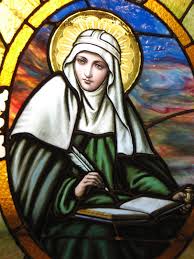HOMILY WEEK 16 02 – Year II
Doing the Will of God:
Optional Memorial of St. Bridget of Sweden
(Micah 7:14-20; Ps 85; Mt 12:46-50)
***********************************************
“For whoever does the will of my Father in heaven is my brother and sister and mother.”
The message for us today could not be clearer: to be close to Jesus, we must do the will of God.
The readings providing this message also give us a portrait of just who that Father of Jesus in heaven is, and how we can do God’s will.
Micah, in the first reading, paints a picture of God who is forgiveness and mercy – pardoning iniquity, passing over our transgressions, not holding onto anger, delighting in showing mercy, full of compassion, treading our iniquities underfoot, casting all our sins into the depths of the sea – all out of unswerving loyalty and faithfulness to God established with our ancestors in the faith, Abraham and Jacob.
Psalm 85 fleshes out this portrait of our God even more as one who not only forgives our sins, but also heals us, restores our fortunes, and grants us God’s salvation. This fits in with a Father who would send his Son Jesus among us with a two-fold mission – to redeem and to sanctify, to forgive and to heal, to not only take away our sins, but also heal us of our sinfulness, that which makes us sin (our painful emotions and negative attitudes). This is all Good News!
Pondering these two readings describing the nature of the Father of Jesus Christ, one can glimpse why Pope Francis has made mercy the defining quality of God for his pontificate. I am sure what also influenced his insistence on that quality of God is the actions of the loving Father in the story in Luke of the two lost sons – one prodigal, and the elder self-righteous. We are invited, as friends and disciples of Jesus, to do what pleases him the most – the will of his Father, in imitation of Mary, his Mother.
An evangelical student once asked me why we Catholics “worshipped” Mary when Jesus pushed her away when she wanted to see him, as in today’s gospel. My response was that this student did not understand the scriptures. Jesus wasn’t pushing his mother away at all. Just the opposite – he was honoring her by using her as an example. Basically, Jesus was saying that as close as he is to his mother physically, as she had given birth to him, we can be even closer to him spiritually, if we do the will of his Father.
What is the will of God? In the Old Testament, it would be keeping the Decalogue, the Ten Commandments, as well as the prescription of Micah himself, who advises us to act justly, love tenderly and walk humbly with our God.
In the New Testament, it would be living out the Beatitudes or eight ways of being Jesus gave us, as well as his commandments I like to summarize as: loving God with our whole being; loving others as we love ourselves, loving one another as he has loved us (a sacrificial love), and above all, loving our enemies by trying to forgive them from the heart.
Given what Jesus said of Mary of Bethany sitting at his feet when Martha, her sister, complained about being left alone to do all the work, I would dare to say doing the will of the Father would include spending time with Jesus his Son in contemplative prayer, as did Mary, who according to Jesus, chose the better part.
And giving the emphasis in the first two readings on the mercy, compassion and especially, the forgiving nature of God, who forgives all our iniquity and casts into the depths of the sea all our sins, I would venture to say that the will of God could also include the celebration of the sacrament of reconciliation on a more regular basis – coming to God for God’s freely offered forgiveness and healing. That is something I personally try to do on a monthly basis, as part of my poustinia or retreat.

St Bridget of Sweden
Today the Church honors another example for us, St Bridget. She was born in Sweden in 1303. Her father was governor of the main province of Sweden and her mother was the daughter of a governor. Throughout her life, Bridget received visions and dreams and possessed gifts of prophecy and healing. After her mother’s death in 1314, Bridget lived with an aunt. She married at 13, bore eight children and lived happily until her husband’s death in 1344. After his death, Bridget moved near a Cistercian monastery, where she lived a penitential life. Seeking papal approval to create a new religious community, she moved to Rome and lived a life of prayer and penitence there for nearly 20 years. She founded the Bridgettine Order in 1370. Originally it included both men and women, but today is for women only. Bridget died in 1373, while returning to Rome from a pilgrimage to the Holy Land. She is patron of Sweden and co-patron of Europe, with St Benedict, St Catherine of Sienna and St Teresa Benedicta of the Cross.
The Eucharist is what Ron Rolheiser OMI calls in his book by that title, our one great act of fidelity. Jesus took and blessed bread and wine, and told us to do this in memory of him. While the church has made many mistakes over the ages, we have been faithful to this teaching of Jesus for over two thousand years. Certainly, to celebrate the Eucharist is to do the will of the Father.
May our celebration draw us closer to the Father and to Jesus, and empower us to live out the Eucharist with love.



